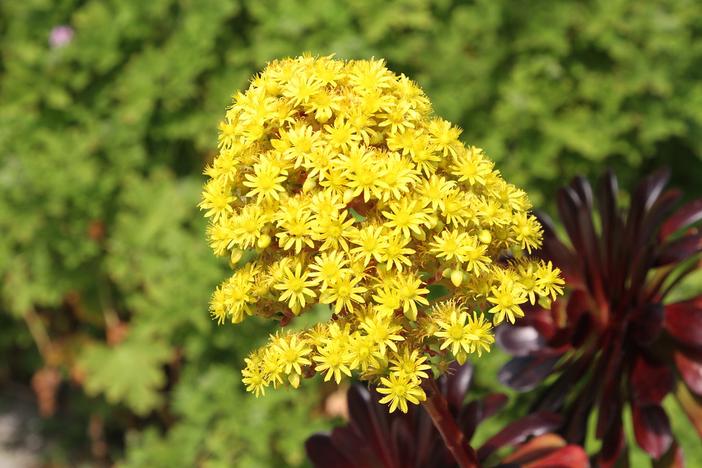Tree Aeonium
(Aeonium arboreum)
Tree Aeonium (Aeonium arboreum)
/
/

Rob Hodgkins
CC BY-SA 2.0
Image By:
Rob Hodgkins
Recorded By:
Copyright:
CC BY-SA 2.0
Copyright Notice:
Photo by: Rob Hodgkins | License Type: CC BY-SA 2.0 | License URL: https://creativecommons.org/licenses/by-sa/2.0/ | Uploader: cvtperson | Publisher: Flickr
















































































Estimated Native Range
Summary
Aeonium arboreum, commonly known as Tree Aeonium, is an evergreen succulent native to rocky, dry slopes and craggy areas on the Canary Islands. This plant typically forms a less branched subshrub and can reach heights of up to 2 meters. The rosettes of waxy, spoon-shaped leaves are arranged at the ends of its branches, giving it a distinctive sculptural appearance. In the spring, it produces large pyramidal panicles of bright yellow flowers, each with narrow oblong to lanceolate, pointed petals that are 5 to 7 millimeters long and 1.5 to 2 millimeters wide, sitting on a 2-to-12-millimeter-long, slightly fluffy flower stem. The stamens are bare, and the overall effect of the bloom is quite showy.
Tree Aeonium is valued for its architectural form and is often used in succulent gardens, rockeries, and as a potted specimen in temperate regions where it must be grown under glass to protect it from cold temperatures. It thrives in full sun and requires low to medium amounts of water, making it suitable for xeriscaping. It prefers well-draining soil, and while it is drought-tolerant, it benefits from occasional watering during extended dry periods. This plant is generally free of serious pests and diseases but can be susceptible to root rot if overwatered. It is not known to be invasive and is relatively easy to maintain, making it a popular choice for gardeners seeking a low-maintenance yet striking plant.CC BY-SA 4.0
Tree Aeonium is valued for its architectural form and is often used in succulent gardens, rockeries, and as a potted specimen in temperate regions where it must be grown under glass to protect it from cold temperatures. It thrives in full sun and requires low to medium amounts of water, making it suitable for xeriscaping. It prefers well-draining soil, and while it is drought-tolerant, it benefits from occasional watering during extended dry periods. This plant is generally free of serious pests and diseases but can be susceptible to root rot if overwatered. It is not known to be invasive and is relatively easy to maintain, making it a popular choice for gardeners seeking a low-maintenance yet striking plant.CC BY-SA 4.0
Plant Description
- Plant Type: Subshrub, Succulent
- Height: 3-5 feet
- Width: 1-2 feet
- Growth Rate: Slow
- Flower Color: Yellow
- Flowering Season: Spring, Winter
- Leaf Retention: Evergreen
Growth Requirements
- Sun: Full Sun
- Water: Low, Medium
- Drainage: Fast
Common Uses
Bee Garden, Bird Garden, Drought Tolerant, Fire Resistant, Low Maintenance, Potted Plant, Rock Garden, Salt Tolerant, Showy Flowers
Natural Habitat
Native to rocky, dry slopes and craggy areas on the Canary Islands
Other Names
Common Names: Tree Aenium, Tree Houseleek, Irish Rose, Trädtaklök
Scientific Names: , Aeonium arboreum, Aeonium arboreum var. arboreum, Aeonium arboreum var. albovariegatum, Aeonium arboreum var. luteovariegatum, Aeonium doremae, Aeonium korneliuslemsii, Sempervivum africanum, Sempervivum arboreum var. albovariegatum, Sempervivum arboreum var. luteovariegatum,
GBIF Accepted Name: Aeonium arboreum (L.) Webb & Berthel.